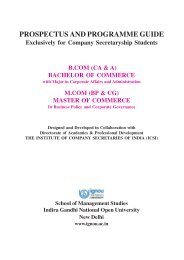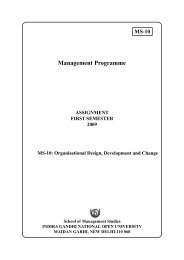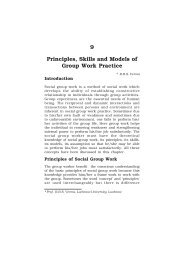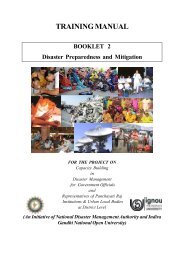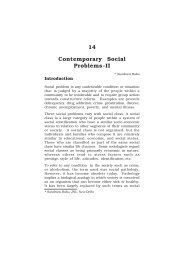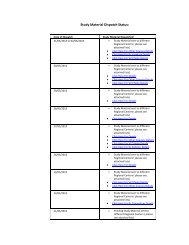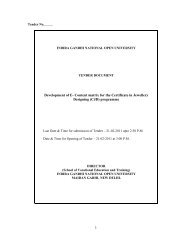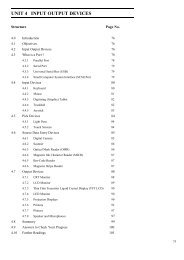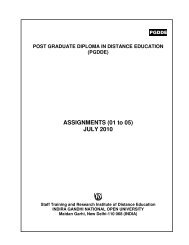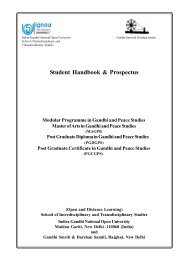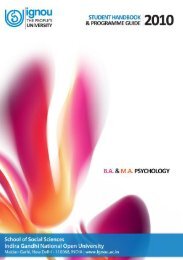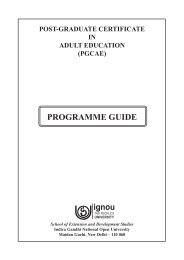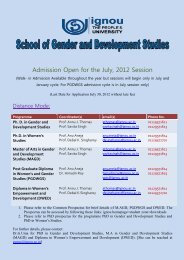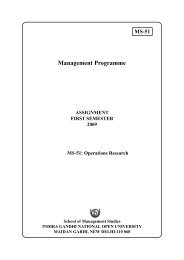PROSPECTUS AND PROGRAMME GUIDE - IGNOU
PROSPECTUS AND PROGRAMME GUIDE - IGNOU
PROSPECTUS AND PROGRAMME GUIDE - IGNOU
Create successful ePaper yourself
Turn your PDF publications into a flip-book with our unique Google optimized e-Paper software.
Level B: Requiring the skill levels of knowledge, comprehension, application, and analysis.<br />
1. Direct Taxes- Comprehensive Study (50%)<br />
Overview of Direct Tax Laws; Direct versus indirect taxes, taxable person; Basic Concepts; A comprehensive<br />
study of the Income-tax Act, 1961; case laws governing capital and revenue expenditure, deemed income,<br />
residence concept; Special problems centering on the concept of assessees, registered firm, Hindu Undivided<br />
Family, Companies, Association of persons and trust, minors, cooperatives, non-resident Indians and avoidance<br />
of double taxation; Salaries, perquisites, gratuity and retirement benefits, income from house property, capital<br />
gains, income from other sources, income from business and profession, problems arising from aggregation of<br />
income and set off and carry forward of losses; Computation of income and Return of Income Tax, Filing<br />
procedure, Principles of valuation of movable and immovable property. Advance payment of Tax; Deduction and<br />
collection of tax at source; Tax incentives and export promotion schemes, other benefits and tax exemptions;<br />
Assessment, appeals, revisions, review, rectification and application to Central Board of Direct Taxes; Penalties,<br />
Fines and prosecution; Refunds; Securities Transaction Tax; Fringe Benefit Tax; Banking Cash Transaction Tax;<br />
Wealth Tax.<br />
2. Practical problems and case studies under Direct Taxes<br />
GROUP II<br />
OBJECTIVES<br />
Course 12<br />
BCO-048: Cost & Management Accounting<br />
To gain understanding and to provide working knowledge of costing concepts, detailed procedures and<br />
documentation involved in cost ascertainment systems.<br />
Learning Aims<br />
●<br />
●<br />
●<br />
●<br />
●<br />
●<br />
●<br />
●<br />
The syllabus aim to test the student’s ability to:<br />
Understand and explain the conceptual framework of Financial Accounting.<br />
Explain the basic concepts and processes in determination of products and services costs<br />
Explain various cost concepts<br />
Apply a range of cost accounting systems<br />
Compare and contrast marginal and absorption costing methods in respect of profit reporting<br />
Apply marginal and absorption costing approaches in job, batch and process environments<br />
Prepare and interpret budgets and standard costs and variance statements<br />
Skill set required<br />
Level B: Requiring the skill levels of knowledge, comprehension, application, and analysis.<br />
1. Basic aspects of Cost Accounting<br />
Cost Concepts and Classification of costs; Materials: accounting and control systems procedures and techniques;<br />
Labour: accounting, incentive schemes and control systems and procedures; Direct Expenses; Indirect expenses:<br />
allocation, apportionment, re-apportionment and absorption of overhead costs; Cost Accounting Standards.<br />
2. Cost Accounting Methods and systems<br />
Job, batch, contract and process costing; Cost accounting for service sector; Accounting entries for an integrated<br />
accounting system - cost ledgers; Reconciliation between cost and Financial profit and loss account; Interlocking<br />
accounting.<br />
A-35



